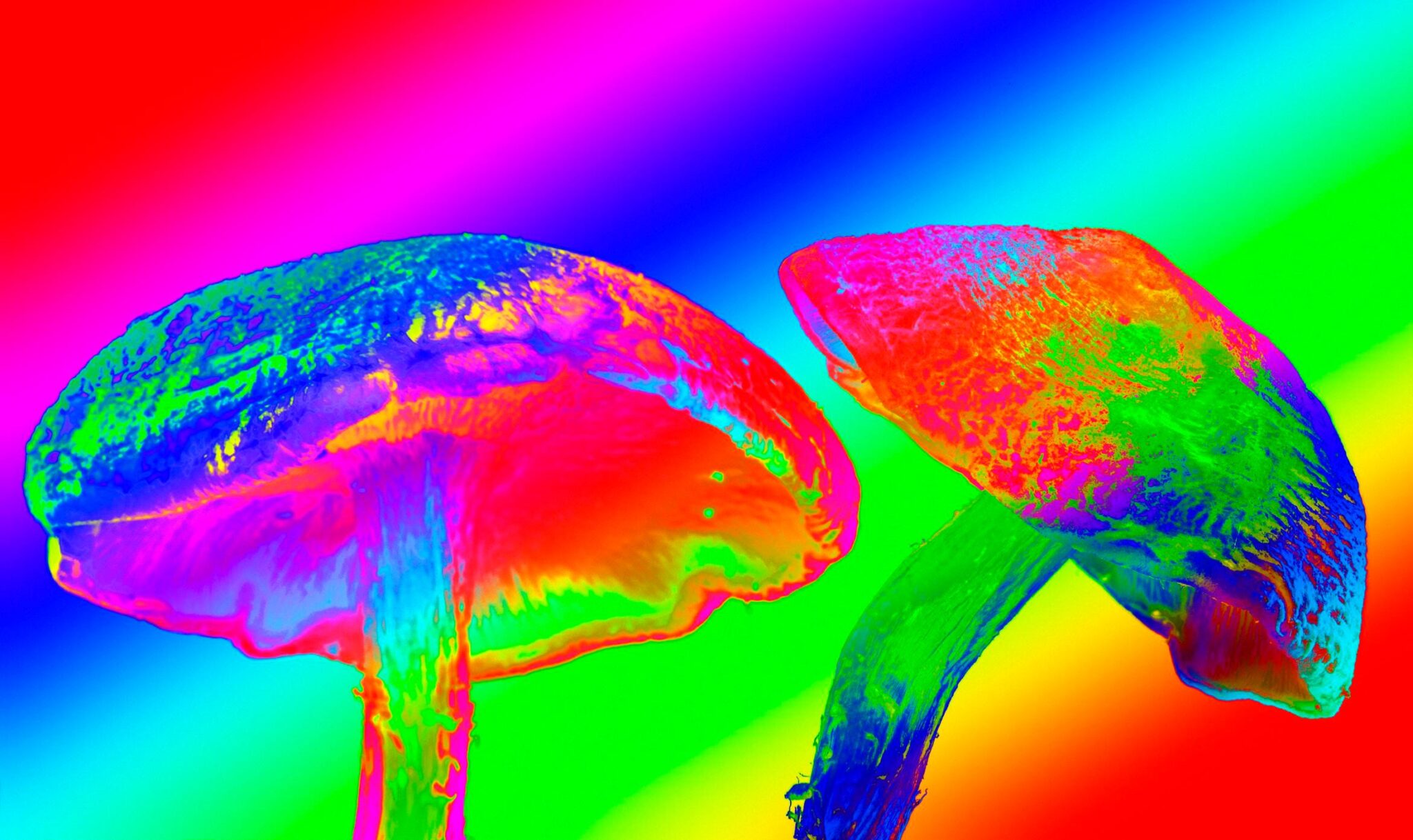
Magic mushrooms, computer-enhanced composite image.
Psychedelic psychotropics are gaining widespread attention. What used to be classified as illicit drugs, accompanied by serious legal ramifications, is now becoming an accepted part of psychiatric and medical treatments for a range of issues including depression and post traumatic stress disorder.
Psychedelics are a class of hallucinogenic drugs whose primary effect is to trigger states of consciousness—commonly referred to as ‘trips’ or psychedelic experiences. The usage creates psychological, visual and auditory changes, and often an altered state of consciousness.
Over the last two decades there has been a growing renaissance of research with psychedelics, the pharmacological class of compounds that include psilocybin, an ingredient found in so-called magic mushrooms. According to the National Institute on Drug Abuse, psilocybin can produce perceptual changes, altering a person’s awareness of their surroundings and of their thoughts and feelings. Treatment with psilocybin has shown promise in research settings for treating a range of mental health disorders and addictions.
The global pandemic exacerbated mental health issues due to, in part, to the unrelenting stress, anxiety, fear of the unknown, concerns over losing jobs, catching and spreading the virus. The World Health Organization reported that nearly a billion people worldwide suffer from mental health problems. In light of this mental health crisis, there is a rising demand for new approaches for treating depression and anxiety.
Mindset Pharma Inc. is a Canadian-based drug discovery and development company focused on creating optimized and patentable next-generation psychedelic medicines to treat neurological and psychiatric disorders. “Mindset is developing a spectrum of differentiated, next-generation medical psychedelics with the goal of improving several factors compared to first-generation psychedelic drugs,” said James Lanthier, CEO of Mindset.
MORE FOR YOU
Joseph Araujo, Chief Scientific Officerand Co-founder of Mindset Pharma, in a wide ranging interview, said that his company is aggressively working on developing several novel families of next-generation psychedelic compounds. He said that Mindset filed multiple patent applications with the goal of building a portfolio of psychedelic-inspired drugs.
He explained that psychedelics are a class of drugs that affect the brain’s serotonin receptors. It triggers changes in sight, hearing, and thought. These types of drugs are commonly known as LSD (acid), psilocybin (psychedelic mushrooms), MDMA (ecstasy) and DMT (dimethyltryptamine).
There has been a growing interest in the usage of psychedelics. A new generation is excited about exploring the possibilities of psilocybin, LSD, ayahuasca, and MDMA. MDMA-assisted psychotherapy was granted Breakthrough Therapy Designation by the U.S. Food & Drug Administration for the treatment of PTSD, and then approved for Expanded Access in 2019, and is currently in Phase 3 clinical trials.
Psilocybin was granted Breakthrough Therapy Designation for both treatment‐resistant depression and major depressive disorder. Psilocybin is being evaluated for the cessation of smoking, the treatment of depression, and reducing the fear of death in individuals with a terminal illness. Ayahuasca, containing DMT, is being evaluated for its ability to combat depression.
Ketamine is now being prescribed for treating psychiatric disorders. Psilocybin, the psychedelic substance found in “magic mushrooms,” is undergoing research conducted by Johns Hopkins, New York University, Massachusetts General Hospital, and University of California, Los Angeles, as a possible cure for psychiatric symptoms.
The BBC previously reported that people in Silicon Valley are taking “magic mushrooms,” which is really a dose of psilocybin, an LSD-type of drug. For example, $2,000 per month will get you your own psychedelic-trip coach guru. He’ll guide you through your mind-altering journey.
Taking mushrooms is a siren’s song luring fast-track professionals to boost their creativity and greatly enhance their work performance. It feels like the next level up from asking your doctor for a prescription of Adderall. White-collar professionals and college students alike cite their Attention Deficit Disorder to get a prescribed drug that elevates their adrenaline, sharpens focus and helps people to work better and faster.
Steve Jobs was said to have partaken in psychedelics and playfully derided his rival, Bill Gates, as being “unimaginative” and suggested that he should drop some LSD. Scott Adams, the creator of the Dilbert cartoon strip, pundit on YouTube and Periscope and resident of Northern California, claims that he took mushrooms once and it was the best day of his life and he no longer felt any limits to his life and career success.
Psychedelic drugs, a category that includes psilocybin, or magic mushrooms, LSD, DMT, MDMA, and other psychoactive substances, are classified as Schedule I drugs by the U.S. Drug Enforcement Agency, which means that they have “no currently accepted medical use and a high potential for abuse.” The substances gained this status due to the government’s growing fears over “bad trips” and distrust of the counter-cultural hippie movement, severely limiting any research into their effects and uses.
The journal Nature published the results of a Phase-III clinical trials study of MDMA-assisted therapy.After three MDMA-assisted sessions, more than two-thirds of patients with severe PTSD saw their symptoms reduced to the point where their condition no longer met diagnostic criteria.
In 2020 the state of Oregon legalized psilocybin, the psychoactive compound in psychedelic mushrooms. Other cities across the country have decriminalized psilocybin too. In February 2021, Cambridge decriminalized all entheogenic plants that contain the psychedelics psilocybin, ayahuasca, and ibogaine, joining Somerville and two other Massachusetts cities.
According to Science Daily, “Previous studies have shown that psychedelic treatment with psilocybin relieved major depressive disorder symptoms in adults for up to a month. Now, in a follow-up study of those participants, the researchers report that the substantial antidepressant effects of psilocybin-assisted therapy, given with supportive psychotherapy, may last at least a year for some patients.”
If Mindset Pharma and others working on these new drugs are successful, it will positively change the lives of many people. They could get back to holding a job and leading a better quality of life. There will be a dire need for more medical, healthcare practitioners, researchers, and scientists to build upon the foundation of what’s happening now.




